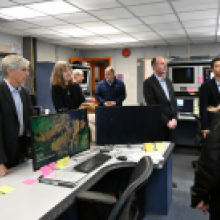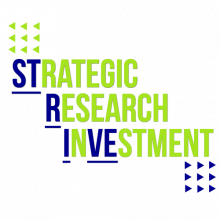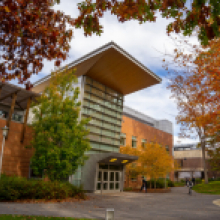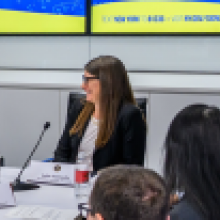A landmark $5 million donation to Binghamton University for AI Research and Development will attract, recruit, and retain tech talent. Researchers here are working on a number of projects to tackle important societal issues, ranging from protecting power systems from malicious attacks to building a robotic seeing-eye dog for the blind.
The AI Plus Institute is a leading center for cutting-edge AI research, education, and collaboration. As the research arm of UAlbany’s AI Plus initiative, the Institute promotes foundational and use-case AI research and matches AI specialists with other faculty and partners with problems and challenges that AI can help solve.
The Institute for Artificial Intelligence and Data Science (IAD) brings together researchers, labs, institutes, and centers of excellence at the University at Buffalo that are focused on advancements in Artificial Intelligence, data science, computational science, and related areas of research to tackle complex problems in AI.
Brookhaven National Laboratory (BNL) is a multipurpose research laboratory housing state-of-the-art facilities. Stony Brook is a partner in Brookhaven Science Associates LLC, managing the Laboratory for the Department of Energy. Located less than 20 miles from campus, BNL provides many opportunities for collaborative research efforts.
The Alliance is a strategic $2B partnership between the State of NY, SUNY, and IBM, focusing on broad and deep expertise and a commitment to advancing the state of the art in AI. Research and development projects conducted under this alliance will focus on AI science, applications, and hardware, promoting both scientific outputs and technology commercialization opportunities.
Fueled by Governor Hochul’s Empire AI initiative, STRIVE, or STatetgic Research InVEstment, comprises of working groups in Data Privacy, Education, Social Impact, Research/Infrastructure, and Workforce/Industry, with the goal of deepening AI faculty networks across SUNY.
The Empire Innovation Program (EIP) supports the recruitment and retention of faculty with strong track records of research accomplishments. EIP hires expand SUNY’s research capacity in strategic priority areas while also strengthening areas where SUNY has a recognized leadership position.
Launched in April 2024 by Governor Kathy Hochul, Empire AI is a bold partnership of New York’s leading public and private universities coming together to establish a state-of-the-art artificial intelligence computing center at SUNY Buffalo. The initiative is already facilitating statewide innovation, research, and development of AI technologies.
Stony Brook University’s AI Institute has acquired a state-of-the-art HGX H100 machine to train advanced machine learning models.










